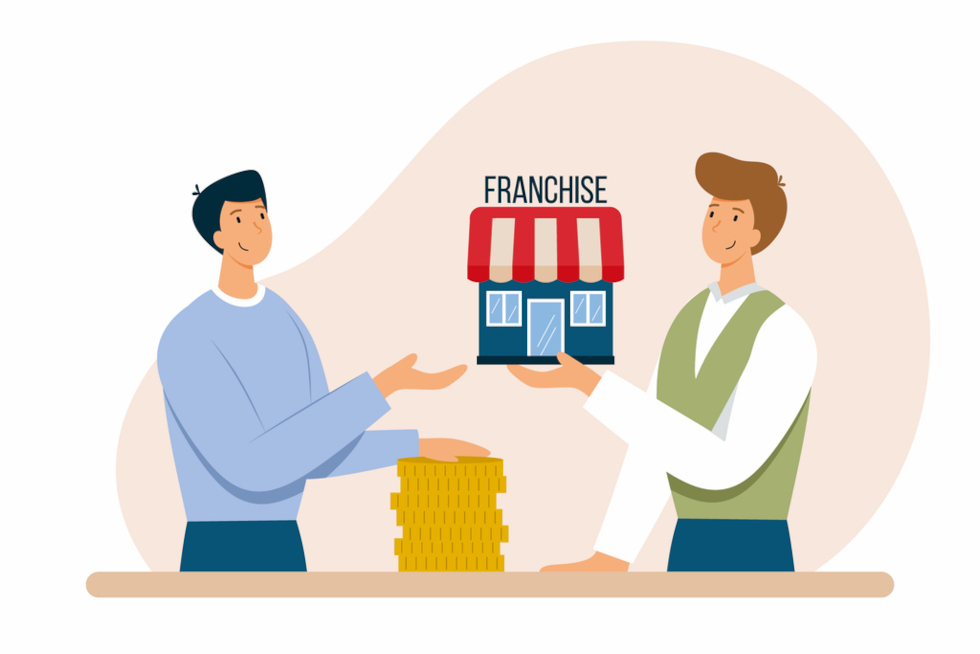Despite a turbulent economic backdrop, more people than ever are starting their entrepreneurial journeys and launching businesses. In fact, 2023 was a record year for starting businesses in the UK, with 900,000 companies set up – up 12% on 2022 – according to research by NatWest and Beauhurst.
While it’s great news that swathes of the public have been bitten by the entrepreneurial bug, this business frenzy can have potential drawbacks. For instance, it’s tougher to stand out from the crowd and launch a truly unique business model or concept – and the competition can be tough. That’s why 20% of businesses, unfortunately, fail in their first year.
Do you want to start your own business but keep some peace of mind and stability? Then franchising could be the option for you.
What is a franchise?
Franchise meaning
A franchise is essentially a business model where an established company – known as the ‘franchisor’ – allows an individual or group – known as the ‘franchisee’ – to operate a business using its brand name, products, services and business methods, typically in exchange for an initial fee and then an ongoing percentage of sales – or royalty payments.
The franchisor generally provides a proven business model, brand recognition, training and support, marketing assistance, operational guidelines and other useful resources and support.
Along with the initial franchise fee and ongoing royalty payments, franchisees need to handle the day-to-day management of the business and must adhere to the franchisor’s standards and practices.
This arrangement allows the franchisor to grow its overall business quickly with less capital, while the franchisee benefits from investing in an established brand and tried-and-tested business system.

A simple example of franchising in action
Dyno-Rod is an established, UK-based plumbing and drainage franchise that has been operating since 1963. Here’s how it functions as a franchise:
- Initial investment: The total investment required to open a Dyno-Rod franchise ranges from £100,000 to £200,000, depending on the size of the territory and the equipment needed. Dyno-Rod also charges ongoing royalties.
- Training: In exchange for the investment, the company provides comprehensive training for franchisees and their staff, covering all aspects of plumbing and drainage services, customer service, and business management.
- Support: Dyno-Rod offers marketing, operations, and technical assistance, as well as a 24/7 call centre to handle customer enquires and dispatch jobs to franchisees.
- Territory: Each franchisee is given an exclusive territory to operate, reducing internal competition.
What are the advantages of franchising?
The benefits of franchising include running an established brand and business model, with proven systems already in place. It can take years – or even decades – for start-ups and independent businesses to not only create a recognised brand, but to also fully implement efficient operational systems.
Another advantage is the business assistance and support. Franchisors provide training, operational guidance and ongoing support, and franchisees usually confer with other franchisees in the network to share best practices and tips.
Franchise businesses also tend to have a lower failure rate than independent new businesses. For example, the British Franchise Association states that less than 1% of franchises in the UK close each year due to commercial failure. This is in contrast to small businesses and independent ventures, which can have failure rates as high as 60%.
As well as marketing support and exclusive territory advantages, franchisees can also benefit from the purchasing power that comes with being part of a larger business. This means better access to financial support, with many lenders being more willing to finance established franchise concepts.
Investment tip: Many franchisors have long-standing relationships with high-street banks. Make sure to assess this during your initial conversations with the brand.

What are the risks of franchising?
One of the obvious initial perceived disadvantages of franchising is that business owners not only need to provide an initial franchise fee, but they also have to pay the franchisor ongoing royalties and other fees. These aspects can impact profitability, but the trade-off is that franchisees receive benefits and advantages that outweigh the costs.
Business owners who crave autonomy and complete freedom might feel constrained by operational restrictions put in place by franchisors. Franchisees are required to adhere to the franchisor’s established systems and processes, which can potentially stymie innovations.
Investment tip: Prospective franchisees need to also factor in the longevity and stability of the franchisor. Newer franchises, especially those based on the latest trends, may not boast the same long-term earning potential as more established franchises.
How do you make money from a franchise?
Franchisees make money in several different ways, which are always established and approved by the franchisor. The primary source of income is revenue generated from selling the franchisor’s products or services. This can include retail sales, service fees or any other income directly related to the business’ operations.
To earn a profit, a franchisee must manage the difference between their revenue and operating expenses, otherwise known as a profit margin. By running a tight ship and ensuring effective cost management processes are followed and high sales volumes are achieved, a franchisee can make healthy profits. Operational efficiency should be setup by the franchisor and should be covered in the initial – or ongoing – training offered.
Marketing support is also a vital part of the franchise investment package. By leveraging this, franchisees can benefit from franchisor-backed marketing campaigns and brand promotions, which can drive customer traffic and sales. Subway’s ‘Fresh Forward’ campaign was largely well received by franchisees, for example, and reportedly led to increased sales, improved customer experience and enhanced brand consistency across the franchise network.
Investment tip: Visit at least two franchisees in person and speak with several others over the phone. Ask about their experience, challenges and relationship with the franchisor. Reputable franchisors will organise this for you if you ask them to do so.

How does the franchisor make money?
A franchisor generates revenue through several different methods, namely an initial franchise fee, ongoing royalties and marketing or advertising fees. The initial investment provides the franchisor with immediate income, while the royalties are usually the main long-term revenue source.
Some franchisors also supply products or services directly to their franchisees and generate additional income through these sales.
In some cases, franchisors also own or lease properties, which they then sub-let to franchisees. A famous example of a franchisor doing this is McDonald’s. In the film The Founder, businessman Harry Sonneborn tells then-McDonald’s CEO Ray Kroc: “You’re not in the burger business. You’re in the real estate business.”
This meant that instead of just profiting from selling burgers, McDonald’s makes money by purchasing land and leasing it to franchisees. Franchisees then pay rent to McDonald’s, often based on a percentage of their sales. This strategy provides McDonald’s with a steady income stream from real estate, in addition to revenue generated from food sales.

Is it better to join a franchise or launch a start-up?
As mentioned previously, there are pros and cons to investing in a franchise or going on your own and launching a start-up. It can mainly boil down to what kind of personality you have, your financial situation and your business goals.
Franchising offers a lower-risk option with the backing of an established brand and support system, making it perfect for those who prefer a more structured, guided approach. On the other hand, starting your own business can provide greater creative freedom and flexibility but can be accompanied by higher risks and challenges.
You must be pragmatic and honest with yourself and talk your ideas and plans through thoroughly with friends and family to determine the best option for you.
Investment tip: Make sure to conduct your own market research in your proposed territory. Things you need to consider are local demand for the product; competition; potential sites; foot traffic; accessibility; and local demographics.
Want to learn more? Here’s some recommended franchise reading
● This helpful article covers everything you need to know about the Franchise Agreement. It also breaks down the financial side of things, including the franchise fee.
● If you’re looking at ways to finance your franchise, this guide has everything you need to know, covering how to choose a lender, what to ask a lender and more.
● Still undecided about franchising? This Is franchising right for you? guide can help you get to the bottom of whether it will work for you.
● How do you find a franchise that suits your skills, experience and bank account? Look no further than this handy guide.
